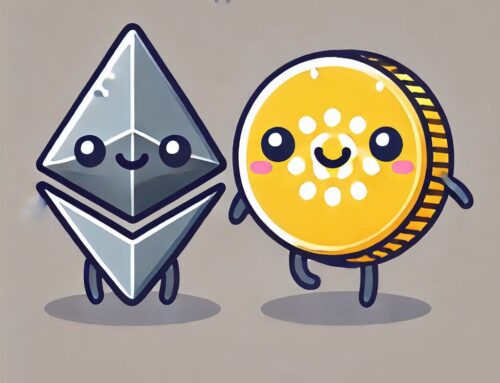Cardano’s Secret Weapon: How Peer-Reviewed Research and Academia Are Building a Smarter Blockchain (One Brain Cell at a Time!)
Let’s pull back the curtain and reveal something that makes Cardano truly stand out from the blockchain crowd: its unwavering commitment to peer-reviewed research and strong ties to the world of academia. No, it’s not just about wearing tweed jackets and attending stuffy conferences (though some of that might be involved!). It’s about grounding its technology in solid scientific principles, rather than just coding by the seat of its digital pants.
Think of it like having a team of brainy superheroes, armed with PhDs and research grants, working tirelessly to build a blockchain that’s not only functional, but also incredibly robust, secure, and maybe, just maybe, world-changing. So, let’s explore this fascinating blend of blockchain, peer-reviewed science, and academia!
More Than Just Code: Why Cardano Values Research and Academia
In a landscape often dominated by hype, speculation, and lightning-fast development cycles, Cardano distinguishes itself through its dedication to academic rigor. It’s not enough to just write code; it’s about understanding the underlying principles, validating them through peer-reviewed research, and then rigorously testing their implementation.
-
Elevating the Standards: Cardano sets itself apart by holding itself to a higher standard, focusing on scientific accuracy and long-term sustainability rather than short-term gains.
-
Moving Beyond “Trust Me, Bro”: In a sphere where trust is often based on marketing or hearsay, Cardano opts to build on a foundation of verifiable fact, building confidence, not just hype.
Why Academic Partnerships Matter: Access to a World of Expertise
By forming partnerships with universities and research institutions, Cardano taps into a wealth of expertise, providing valuable insights for the whole blockchain field.
-
The Best and Brightest: Collaborating with institutions grants Cardano access to world-class experts in computer science, cryptography, distributed systems, and other vital fields.
-
A Collaborative Ecosystem: This collaboration isn’t just about funding projects; it’s about fostering a symbiotic relationship where academia and industry work together to push the boundaries of blockchain technology.
-
Ensuring a Robust Foundation: Like architects consulting with structural engineers, Cardano’s reliance on experts ensures a sturdy design that avoids foreseeable faults.
Key Academic Partnerships: Building a Global Brain Trust
Cardano has forged strong partnerships with universities and research institutions worldwide, ensuring its development is informed by cutting-edge knowledge. These aren’t just token gestures; these are active collaborations that shape the direction of the project.
-
Spanning Continents: These partnerships span continents, bringing together a diverse range of perspectives and areas of expertise.
-
Tackling Key Issues: The partnerships are strategically focused on areas crucial to blockchain’s long-term success, from cryptographic security to scalability and governance.
Here are a few notable examples of Cardano’s academic partnerships:
-
University of Edinburgh (UK):
-
Focus: Formal verification of smart contracts, distributed ledger technologies, cryptographic protocols.
-
Contributions: Collaboration on the development of Plutus, Cardano’s smart contract language, and research into formal methods.
-
Significance: The University of Edinburgh’s academic prowess in formal methods helps guarantee the security and reliability of the Cardano platform.
-
-
University of Wyoming (USA):
-
Focus: Blockchain scalability, consensus mechanisms, and cryptography.
-
Contributions: Collaboration on developing new scaling solutions, such as Hydra, a technology designed to boost transaction throughput.
-
Significance: The University of Wyoming’s expertise in scalability is crucial for Cardano’s ability to handle future growth.
-
-
Tokyo Institute of Technology (Japan):
-
Focus: Cryptography, consensus algorithms, and distributed systems.
-
Contributions: Collaboration on developing new cryptographic techniques and protocol improvements.
-
Significance: The Tokyo Institute of Technology’s deep knowledge of cryptography helps secure the Cardano network from potential attacks.
-
-
University of Athens (Greece):
-
Focus: Network protocols, distributed systems, and cryptography.
-
Contributions: Collaboration on the development of more efficient network protocols and new smart contract models, pushing the bounds of innovation.
-
Significance: The University of Athens contributes valuable expertise in network architecture, essential for Cardano’s seamless operation.
-
The Benefits of Cardano’s Peer-Reviewed Approach: Ensuring Long-Term Stability
By prioritizing peer-reviewed research, Cardano takes steps that many other platforms do not, improving the long term sustainability, and reducing risks.
-
Solid Security: Peer review helps to identify and eliminate potential vulnerabilities, greatly enhancing the system’s overall security.
-
Increased Reliability: By scrutinizing code and design thoroughly, developers can build features which minimize bugs, which provides a higher-quality end product.
-
Accelerated Innovation: While it may sound counter-intuitive, a careful research approach actually allows for more productive innovation and the introduction of new features.
-
Greater Trust: Users can have more confidence in systems that were built using a formal approach with peer-reviewed code.
Formal Methods: Proof Beyond Testing (Math is a Superpower!)
In addition to peer-reviewed research, Cardano also makes use of formal methods, to verify the code base.
-
More Thorough Than Testing: Using formal methods allows for a more mathematical approach, which removes much of the uncertainty that comes with traditional testing, providing guarantees that the code works as expected.
-
Eliminating Vulnerabilities: Finding and eliminating even subtle vulnerabilities with math allows for the network to be more resistant to attacks.
-
Increasing Reliability: Code that is verified with these methods can be relied upon more, with more consistency, for various processes.
Cardano’s Commitment to Academia: Creating a Powerful Combination
The combination of peer-reviewed research and formal methods is more powerful together, as it ensures that Cardano is built on the best possible principles.
-
Better Technology: With these two methods combined, the overall technology that is produced is more robust and provides more tangible benefits.
-
A Higher Standard: This approach also sets a higher standard for blockchain projects, with the goal of inspiring greater care for accuracy, security, and realiability.
Examples of Cardano’s Code
The Cardano code utilizes languages such as Haskell and Plutus, which allows for the creation of verifiable smart contracts.
-
Smart Contracts: Allows for decentralized financial applications, by supporting the creation of automated, secure, and verifiable contracts.
-
Token Creation: The processes surrounding token creation are based on specific logic that supports the issuance, management, and distribution of digital tokens.
-
Multi-Signature Transactions: Using a smart contract, multiple signatures are required to execute a transaction, increasing security.
-
Decentralized Governance: Cardano governance allows for community members to vote and decide on proposals to implement new features and upgrades.
The Takeaway: Cardano isn’t Just Code, It’s Science!
The philosophy of Cardano is rooted in peer-reviewed research, academia and formal methods. This rigorous approach ensures that the network is built on a solid scientific foundation, making it more secure, stable, innovative, and sustainable. It’s a commitment to quality and a belief that blockchain technology should be built on sound scientific principles. It’s not just about building a useful blockchain; it’s about setting new standards for quality, security, and trustworthiness in the blockchain world.





